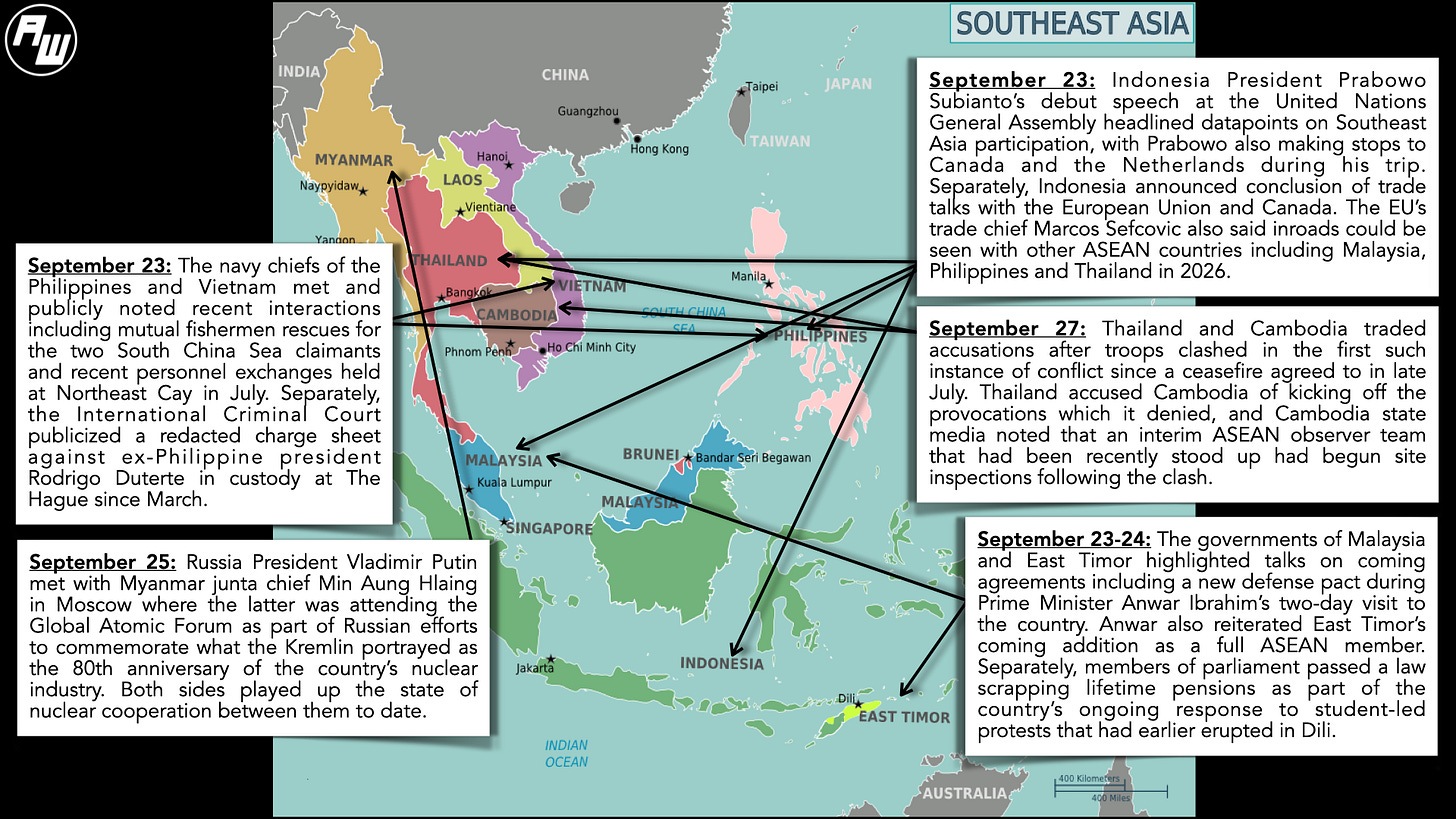Rejecting Thucydides, Prabowo UN Debut Headlines Active Week
Plus new geoeconomic deals; atomic diplomacy; trade pact launch; space talks; nuclear agency kickoff; influence wars; major bill rejection and much, much more.
Greetings to new readers and welcome all to the latest edition of the weekly ASEAN Wonk BulletBrief! If you haven’t already, you can upgrade to a paid subscription for $5 a month/$50 a year below to receive full posts by inserting your email address and then selecting an annual or monthly option. You can visit this page for more on pricing for institutions, groups as well as discounts. For current paid subscribers, please make sure you’re hitting the “view entire message” prompt if it comes up at the end of a post to see the full version.
For this iteration of ASEAN Wonk BulletBrief, we are looking at:
Assessing the geopolitical and geoeconomic significance of the recently-concluded United Nations meetings and sideline engagements, including regional and international implications;
Mapping of regional developments, such as new geoeconomic deals; atomic diplomacy and coming defense pact;
Charting evolving geopolitical, geoeconomic and security trends including new nuclear agency, trade agreement launch and space futures;
Tracking and analysis of industry developments and quantitative indicators such as future infrastructure link inroads; biggest natural gas plant chatter; giant bill rejection and more;
And much more! ICYMI, check out our ASEAN Wonk review earlier this week of a new book on the future shape of emerging security threats in Southeast Asia and the wider Indo-Pacific region.
This Week’s WonkCount: 2,237 words (~10 minutes)
New Geoeconomic Deals; Atomic Diplomacy & More

Influence Wars; Shifting Mixes & Fragmentation Anxieties
“ The Southeast Asia Influence Index shows a region in which China looms large, everywhere,” observes a new publication from the Lowy Institute in Australia. The Index notes that while no single country is under a sphere of influence of a single external partner, several countries are deemed highly exposed to China in specific sectors such as tourism, investment, or trade (link).
Overall Southeast Asia Influence Index Scores — Intraregional and Extraregional Statistics for 2025
“Meeting the region’s ambitious renewable energy goals will require sustained political will,” cautions a new Southeast Asia-focused report released by the International Energy Agency (IEA). The report notes several important next steps that need to be taken given 20 terawatts of untapped variable renewable energy and technical potential in the region by one count (roughly 55 times the region’s current total generation capacity) (link).
Southeast Asia Electricity Demand By Scenario and Share of Consumption Out to 2050
“The task force recommends that in the short-term, the priority is to ensure the current trade war will not be contagious,” according to a summary of key recommendations by the members of the recently-formed ASEAN Geoeconomic Task Force published by The Jakarta Post. The task force also recommends a series of other steps including opportunities for collective action and subregional institutional strengthening (link).
Rejecting Thucydides, Prabowo UN Debut Headlines Active Week
What’s Behind It
Indonesia President Prabowo Subianto’s controversial debut at the United Nations headlined an active week of diplomacy with wider regional and global implications1. While Prabowo unsurprisingly did not shy away from grand, headline-making claims including urging the audience to reject the oft-cited line from Thucydides’ History of the Peloponnesian War that “the strong do what they can, the weak suffer what they must” — a statement drowned out by hype drummed up by Israeli Prime Minister Benjamin Netanyahu that Indonesia had softened its position on the Israel-Palestine issue that officials then had to clarify — several other notable storylines also played out over the week2. Despite UN Secretary General Antonio Guterres’ striking warning about history’s lessons from “multipolarity without strong multilateral institutions,” officials noted a rather sobering tone as the institution marked its 80th anniversary amid concerns over everything from the situation in Gaza to the potential impact of aid cuts to undermine decades of continued progress in critical areas like child mortality3. On the positive side of the ledger, incremental steps were announced in areas like broadening what officials have admitted has to date been an overly exclusive artificial intelligence conversation4.
Regional Developments Amid United Natons High-Level Week and 80th Anniversary Commemoration
Notable sideline developments also highlighted the stakes for Southeast Asia and Indo-Pacific states within the wider global agenda. U.S. officials cited inroads on functional areas such as maritime security featuring several ASEAN states and minilateral diplomacy with Northeast Asian and Pacific Island states in sideline meets even though there was much more media focus on U.S. President Donald Trump’s speech5. Southeast Asian countries also tried to actively push their own agendas within an already active week, with cases in point being the Philippines reiterating its talking points for a non-permanent seat on the United Nations Security Council and Malaysia’s foreign minister vividly highlighting regional concerns around Gaza and the Thailand-Cambodia dispute (even as Prime Minister Anwar Ibrahim was beating back some domestic criticism around the planned agenda for the upcoming ASEAN summit in a few weeks)6.
Why It Matters
The developments also point to priority policy datapoints to watch across major countries with wider regional as well as global implications (see originally generated ASEAN Wonk table below on notable areas to monitor and additional specifics. Paying subscribers can read on for more on what to expect and future implications in the rest of the “Why It Matters” and “Where It’s Headed” sections, along with paid-only sections of the newsletter as usual).











